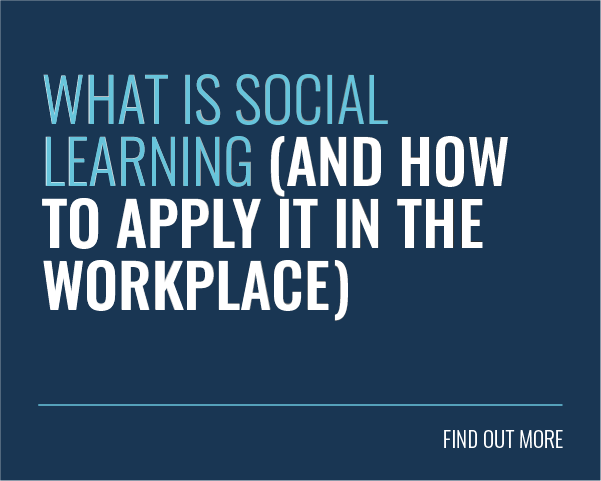 There are many terms for a knowledge-sharing culture.
There are many terms for a knowledge-sharing culture.
The knowledge market. A company culture of collective intelligence. A corporate learning culture. The transfer of learning. A culture of sharing. Talking to a chum! All sorts!
Whatever you call it, its value cannot be underestimated. In the modern environment of high staff-turnover, knowledge-sharing is now the difference between hanging on for survival and thriving.
Did you know Fortune 500 companies lose roughly $31.5 billion a year by failing to share knowledge?
This is because knowledge can fall through the cracks when staff move on. The reverse happens when new staff join. They have to relearn everything before they can thrive, meaning it’s harder for them to succeed, in turn, making it harder for your business to succeed.
For your business to thrive in this tougher-than-ever business climate, a knowledge-sharing culture is non-optional. So what is it and how can you build on? Read on!
A Knowledge-Sharing Culture: The Definition
A lot of people are put off knowledge-sharing culture as it doesn’t sound very corporate. It has an air of the sixties about it, knowledge-sharing sounds like something you might do whilst braiding a friend’s hair and listening to ‘The Best of Chime Sounds’ on YouTube.
Well, scrap that idea. In business, a knowledge-sharing culture can be defined like this:
‘A knowledge-sharing culture is a corporate culture which encourages and enables the free exchange of knowledge, insight and experience in order to benefit individuals and drive a business toward key strategic goals.’
Knowledge sharing is too important not to make a priority of. But, with Growth Engineering LMS and Growth Engineering Learning App it’s easy!
And once you’ve got a knowledge sharing culture in place, there’s no limits to what you can achieve as a business. True impact awaits.
If you’re interested in learning more about the importance of your organisation’s shared knowledge, the best place you could possibly start is with our ‘Guide to Intellectual Capital‘.
Check out what Growth Engineering’s CEO and all-round knowledge-sharing expert has to say:
What’s the History of Knowledge-Sharing?
It doesn’t take a rocket scientist to work out that knowledge-sharing as a concept isn’t anything new. On that note, here’s a very condensed timeline of the major occurrences in the life of knowledge sharing:
15,000 BC
The earliest signs we have of knowledge sharing are around 15,000 BC when cave drawings were used to warn other humans of dangerous animals and other life-saving lessons!
1440 AD
1440 was the first time information was distributed easily in the form of printed material. Newspapers such as The Daily Courant (1702 – 1735) slowly but surely began circulating on a larger and larger scale.
1840 AD
Fast forward to 1840 and libraries were no longer exclusive clubs for the privileged; they became public. Knowledge is power and that’s what libraries gave us.
The 1900s
When the watercooler splashed into offices in 1911, it finally gave workers from different departments a place where they could gather and discuss projects and share their wealth of knowledge.
Radio and television revolutionised the scale and scope of knowledge-sharing in the 1900s. We could now receive a news update within minutes of it happening.
The Internet and the Information Revolution
The 6th of August 1991 was when the World Wide Web became public. Knowledge-sharing would never be the same again.
Creating a Knowledge-Sharing Culture
Now we know what it is, and its value, how do you build a knowledge-sharing culture of your own? Here are seven ways:
1. Encourage Team Bonding
Team bonding is pivotal to social learning. Without a sense of community, the motivation to actually share is teeny. It just feels too awkward!
A study by the Kenexa Research Institute found that 50% of the positive changes in communication patterns within the workplace can be credited to social interaction outside of the workplace.
2. Employ Virtual Rewards for Sharing Incentives
Sometimes we need external motivators in order to play nice! Like when coffee shops offer you a free coffee with a stamp card if you return. This is what we call being extrinsically motivated.
Admins can reward knowledge-sharers by employing gamification in the form of experience points (XPs), leaderboards, and virtual badges.
3. Offer Real-Life Rewards
Some colleagues will be more incentivised to share their knowledge with the dangling hope of real-life rewards, rather than virtual accolades. Yes, our wages are a great extrinsic motivator for working, but like a curious cat, extrinsically motivated workers are always looking for that extra bit of cream on top…
Real-life rewards can be anything from free lunches with the management, to vouchers for online retailers, to discounts for local shops. A big motivator for chocolate lovers! On Growth Engineering LMS you can use the Reward Centre to offer real-life incentives in exchange for points or badges!
4. Let Employees Know the Value of Their Knowledge
Sometimes it’s the case that an employee simply doesn’t feel that their knowledge is worth sharing. This is why some employees need to be encouraged to share their wealth of knowledge with everyone in the team.
It’s important to continually reinforce the message that all knowledge is worth sharing!
5. Identify and Capitalize on your Knowledge Experts
In every organisation, there’s a cluster of people who stick out as brainboxes. We all know the ones! We can’t put our finger on why, but there’s a certain information overload about them that makes them ooze with intellect.
Capitalise on these brainy individuals by giving them a platform to share their wealth of knowledge! If they need an incentive, then check back to two and three!
6. Include Them as Job Requirements
A lot of employees will not even think about knowledge sharing as it’s not an obligation. Plus, most of us are so busy that we simply don’t make the time! If we make knowledge sharing a job requirement from the offset, then it’ll soon be embedded into the psyche. Before long, knowledge sharing will become as natural as liking Bill Murray!
If that’s too much for you then at the very least include it in your onboarding process.
7. Personalise Your Training Programme
By tailoring your training programme, you’ll be making your content more accessible, more visually appealing and more engaging to the learner. In turn, this will be a place they’ll want to return to and share knowledge again and again.
With our learning solutions, you can add your logo, customise your colour palette, and customise your banners as well as a host of other customisable features. The point is, it’s the little touches like this that make your platform all the more engaging. Making your team feel like a part of a community who want to share is key.
The Two Best Solutions for Creating a Knowledge Sharing Culture
Businesses are still trying to discover the best knowledge sharing activities and strategies. Something that has so much potential to transform your organizational culture needs a proper hub to call home.
Encompassing a knowledge-sharing culture empowers the employees and as a result, the organisation benefits as a whole. So how do we initiate a knowledge sharing culture?
Email and chat can’t do it alone! This is where we step in…
Growth Engineering LMS
 Growth Engineering LMS is a learning management system that uses the power of engagement, behavioural science and learning best practice to drive amazing results. It’s also a gamified solution, using game mechanics such as Leaderboards and Experience Points to drive learner engagement.
Growth Engineering LMS is a learning management system that uses the power of engagement, behavioural science and learning best practice to drive amazing results. It’s also a gamified solution, using game mechanics such as Leaderboards and Experience Points to drive learner engagement.
Here are four reasons it’s the perfect tool for your business:
1. Clubs
Clubs are designed to replicate how real-life clubs work; an area where like-minded communities can get together and engage in open communication, collaboration and much more.
You can use Clubs to build a robust knowledge base by creating niche discussion groups. Examples may include a Club for onboarding advice and tips, or a Club for sharing knowledge on UX design.
2. Social Feed
If you want your knowledge-sharing to reach everybody in the company, then a social feed may be the way to go! It works just how a social feed on social platforms work, which makes it second nature to most of us. Instead of using it to post videos of cats, however, you can use it to post videos of industry experts, whitepapers, guides, tip sheets, infographics, industry podcasts and much more.
3. Live Chat
Everywhere offers instant answers now. Gone are the days where we have to wait days for an email response. Instant message is the new customer to company relationship.
In fact, a whopping 42% of customers prefer a live chat service rather than correspondence via phone or email. So why shouldn’t learners expect the same level of response?
Growth Engineering LMS offers a live chat service so that learners can ask appointed members of staff whatever they need to know.
4. Experts
In every company, there are always those super people who seem to just naturally know more than everyone else. Why not tap into this form of intellectual capital for your training and create an experts area? Our LMS provides such an area where the brainiest in finance, HR, customer service, IT, product, marketing etc can be asked whatever is needed.
Growth Engineering Learning App
 Growth Engineering Learning App is a mobile learning app that makes behaviour change and employee engagement easy! On top of this, it’s the perfect vehicle through which to drive your knowledge management initiative!
Growth Engineering Learning App is a mobile learning app that makes behaviour change and employee engagement easy! On top of this, it’s the perfect vehicle through which to drive your knowledge management initiative!
Here are four reasons Growth Engineering Learning App is the app for you!
1. It’s Mobile-Friendly
Growth Engineering Learning App was built for mobile use. For this reason, it’s ideal for sharing knowledge while on the go. No longer are we shackled by the perils of time. The TKA gives you offline access and lets you share microunits to fill knowledge gaps at the drop of a hat.
As well as this, there’s a host of built-in authoring tools, a vigorous reporting suite, Push Notifications and Streaks and Scorecards.
2. Battles
Battles are a learning asset unique to Growth Engineering. They give your training a competitive edge, they reinforce training using repetition and they’re a fun way to share knowledge.
Battles allow admins to create multiple-choice questions and pitch learners against each other in a fierce battle of the wits! They also encourage scenario-based training.
This is where questions are made from real-life situations, and the answers will give you a choice of reactions. This narrative-focused type of training will help to boost knowledge retention.
3. FAQs
One issue with intellectual capital is that it’ll often disappear when the expert leaves the company. So how do you ensure the information is banked? One way is by creating a space for frequently asked questions.
This FAQs page doesn’t particularly need a great deal of effort. Simply request your experts fill this in as and when they’re asked a query. It makes for effective knowledge sharing!
4. Subscriptions
Learners can subscribe to the posts of their knowledge-sharing colleagues. This means they get a notification every time they post!
Final Word
Knowledge sharing is too important not to make a priority of. But, with Growth Engineering LMS and Growth Engineering Learning App it’s easy!
And once you’ve got a knowledge sharing culture in place, there’s no limits to what you can achieve as a business. True impact awaits.
If you’re interested in learning more about the importance of your organisation’s shared knowledge, the best place you could possibly start is with our ‘Guide to Intellectual Capital‘.





